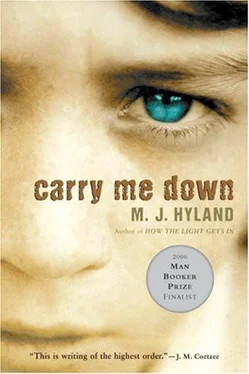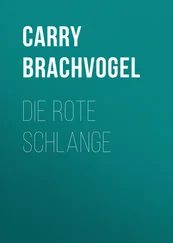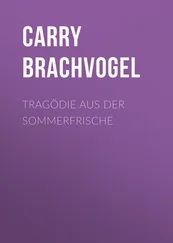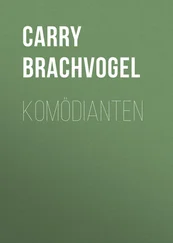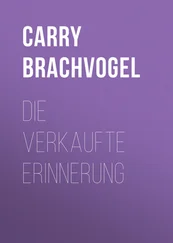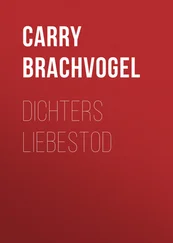M. J. Hyland
Carry Me Down
For
Stewart Andrew Muir
(if only there were more like you)
It is January, a dark Sunday in winter, and I sit with my mother and father at the kitchen table. My father sits with his back to the table, his feet pressed against the wall, a book in his lap. My mother sits to my right and her book rests on the table. I sit close to her, and my chair, which faces the window, is near the heat of the range.
There is a pot of hot tea in the middle of the table and we each have a cup and plate. There are ham and turkey sandwiches on the plates and, if we want more to eat or drink, there is plenty. The pantry is full.
From time to time we stop reading to talk. It is a good mood, as though we are one person reading one book — not three people apart and alone.
These kinds of days are the perfect ones.
Through the small, square window I can see the narrow country road that leads to the town of Gorey and, beyond the road, a field of snow. Beyond the field of snow, although I cannot see it now, is the tree I pass every morning and two miles beyond the tree is Gorey National School, where I will return at the end of the Christmas holiday.
On the corner of the road, to the left of the front gate, there is a post with a sign pointing to Dublin and another, smaller sign beneath it, pointing to the cemetery. For two more days we will be together, the three of us, and that’s what I want. I don’t want anything different.
* * *
When I see that my mother is near the last page of her book, I take a pack of playing cards and move it towards her elbow. Soon, she will put her book down and offer me a game. I look at her face and wait.
Suddenly, she closes her book and stands.
‘John,’ she says, ‘please come with me.’ She is taking me out to the hallway, away from my father. She is taking me out of his sight as though I am the rubbish. ‘Come now and leave your book behind,’ she says.
We stand at the base of the steep and narrow stairs that lead up to my parents’ loft-bedroom — the only room upstairs — and she leans against the banister with her arms folded across her chest, the skin on her hands cold and white like chalk.
‘Do I look different today?’ she asks.
‘No. Why?’
‘You were staring again. You were staring at me.’
‘I was only looking,’ I say.
She moves away from the banister and puts her hands on my shoulders. She is 5 feet 10 inches tall and, even though I am only one and a half inches shorter, she bears down on me until I sink lower. Her body hunches over and her bottom pokes out.
‘You were staring at me, John. You shouldn’t stare like that.’
‘Why can’t I look at you?’
‘Because you’re eleven now. You’re not a baby any more.’
I am distracted by the cries of our cat, Crito, who is locked in the cupboard under the stairs with her new kittens. I want to go to her. But my mother presses harder.
‘I was only looking,’ I say.
I want to say that there is nothing babyish about looking at things, but my body shakes beneath the weight of her arms and I am trembling too much to speak.
‘Why?’ she asks. ‘Why do you have to stare at me like that?’
She is hurting my shoulders and her weight is surprising. She looks lighter and smaller and more beautiful when she’s sitting at the table or at the end of my bed, talking to me, making me laugh. I’m angry with her now, for being tall, for being so big, so heavy and for making me so big, far too big for my age.
‘I don’t know why. I just like it,’ I say.
‘Maybe you should get out of the habit.’
‘Why?’
‘Because it’s unnerving. Nobody can relax when you stare at them like that.’
‘Sorry,’ I say.
She stands up straight now and releases me. I lean across and kiss her near the mouth.
‘All right then,’ she says.
I kiss her a second time, but when I put my arms around her neck to pull her in closer so that we can hug, she pulls away. ‘Not just now,’ she says. ‘It’s cold out here.’
She turns and I follow her back into the kitchen.
My father’s dark, curly hair is messy and his fringe has fallen down over his eyes. ‘Shut the door,’ he says, without looking up from his book.
‘It’s already shut,’ I say.
‘Good,’ he says. ‘Keep it shut.’
He smiles in the direction of his book: Phrenology and the Criminal Cranium .
My father hasn’t worked for three years, for as long as we’ve lived here, in his mother’s cottage. Before we moved in with my grandmother, he worked as an electrician in Wexford, but he hated his job, and said so every night when he got home. Now, instead of going to work, he reads. He says he is preparing for the entrance exam at Trinity College, and that he shouldn’t have too much trouble passing because last year he sat the Mensa test and passed with flying colours.
‘Look out the window,’ I say to my mother. ‘It’s snowing sideways.’
‘So it is,’ she says. ‘Doesn’t it look like flour coming through a sieve?’
‘Flour doesn’t go sideways through a sieve,’ I say.
Her tongue comes out to lick the corner of her mouth and it stays out. I lean across the table to touch it.
‘Your tongue is cold,’ I say.
My father looks at us, and my mother’s lips clamp shut.
‘I’m like a lizard,’ she says.
She smiles at me, and I smile back.
‘A strange pair,’ says my father.
Crito is quiet now. She’s probably glad to hear us talking and to know we are near by.
I return to reading the Guinness Book of Records , my favourite book. I own every edition with the exception of the 1959 edition and it is one of my Christmas presents every year.
I have a few pages left to read of the new edition for 1972, and I have almost finished reading the Human World section for the fourth time. The Guinness Book of Records is full of wonders, like the Chinese priest who holds the record for the longest fingernails. It took him twenty-seven years to grow nails twenty-two inches long and in the photograph they are black and curled, like a ram’s horns.
Best of all are the escape artists and men like Blondin, who crossed Niagara Falls on a high wire, and Johann Hurlinger, who walked on his hands for more than fifty days. He walked for 871 miles on his hands.
One day I will be in the Guinness Book of Records , along with all the other people who do not want to be forgotten or ignored. I will break an important record or do a remarkable thing. I don’t see the point of living unless there is something I can do better than anyone else can or unless I can do something that nobody else can do.
I fold the picture of the shortest woman in the world so that she’s up against the tallest man. His name was Robert Pershing Wadlow, and he was 8 feet 11.1 inches. By the age of eleven he was already 6 feet 7 inches tall.
I used to wonder if his voice started to break early the way mine has. I used to wonder whether I would become a giant. I still worry about these things but less now that I have decided that I won’t end up in the Guinness Book of Records for being a freak. I will get in there for a much better reason.
The shortest woman was Pauline Musters, and she was 1 foot 11.2 inches. When I fold her picture against the tallest man, she looks like something that has fallen from his pocket, not like a person at all: a person does not stand next to another person and reach the bottom of that person’s knees.
‘Look,’ I say to my mother. ‘This midget looks like an ormamint.’
I already know what she is going to say.
Читать дальше
